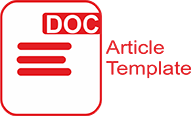Analisis Kondisi UMKM pada Masa Pandemi COVID-19 di Kota Pekanbaru (Studi Kasus UMKM Makanan dan Minuman)
Abstract
Micro, Small and Medium Enterprises (MSMEs) have an important role in increasing the country's gross domestic product. However, since COVID-19 hit the world at the end of 2019, as well as various government policies that were in effect in tackling the COVID-19 pandemic, many business actors experienced a drastic decrease in income and not a few were unable to maintain their businesses which led to closure, one of which was the food and beverage business. This study aims to get an overview of the condition of MSMEs in the food and beverage sector during the COVID-19 pandemic in Pekanbaru City. The research was carried out for 2 months from August to September 2021. The research method used was descriptive quantitative using purposive sampling technique with the source of information in the form of questionnaire interviews with a sample of 100 food and beverage MSMEs. The results showed that the profit obtained by food and beverage MSMEs in Pekanbaru City during the COVID-19 pandemic has quite diverse numbers with the highest dominance of profit <50 million as 62 MSMEs, followed by 24 MSMEs for profits of 50 million-<100 million. This data shows that food and beverage MSMEs are still unable to maximize their business potential, one of which is caused by COVID-19 and the policies that applied by the government during the COVID-19 pandemic. The Large-Scale Social Restrictions policy implemented by the government requires business owners to cut business active time only up to 9 pm and reduce the number of consumers by 50% for dine-in. The government's policy of limiting business hours during the COVID-19 pandemic is an important factor in the decrease in food and beverage MSMEs business income during the COVID-19 pandemic.
Keywords
Full Text:
PDFReferences
Bastaman, A., dan Juffiasari, R. 2015. Faktor yang mempengaruhi pengambilan keputusan bagi wanita untuk berwirausaha (studi kasus anggota ikatan wanita pengusaha Indonesia DKI jakarta). Prosiding seminar nasional 4th UNS SME’s summit & Awards.
Mokalu, B. J. 2016. Perempuan berwirausaha mengentas ekonomi keluarga. Jurnal LPPM Bidang EkoSosBudKum, 3(2), 72-88.
Peta sebaran COVID-19 pada https://COVID-19.go.id.
Suci, Y. R. 2017. Perkembangan usaha mikro, kecil dan menengah. Jurnal Ilmiah Cano Ekonomos. 6(1).
Sugiono. 2009. Metode penelitian bisnis. Bandung:Alfabeta CV.
Sugiyono. 2010. Metode Penelitian Pendidikan Kuantitatif, Kualitatif dan R&D. Bandung:Alfabeta CV.
Tambunan, T. H. 2003. Usaha kecil dan menengah di Indonesia, beberapa isu penting. Jakarta:Salemba empat.
Undang-undang No 20 tahun 2009 tentang Usaha Mikro, Kecil dan Menengah (UMKM) pada https://www.bi.go.id.
DOI: http://dx.doi.org/10.31258/jip.18.1.8-13
Refbacks
- There are currently no refbacks.
Copyright (c) 2022 JIP ( Jurnal Industri dan Perkotaan )

This work is licensed under a Creative Commons Attribution-ShareAlike 4.0 International License.
















